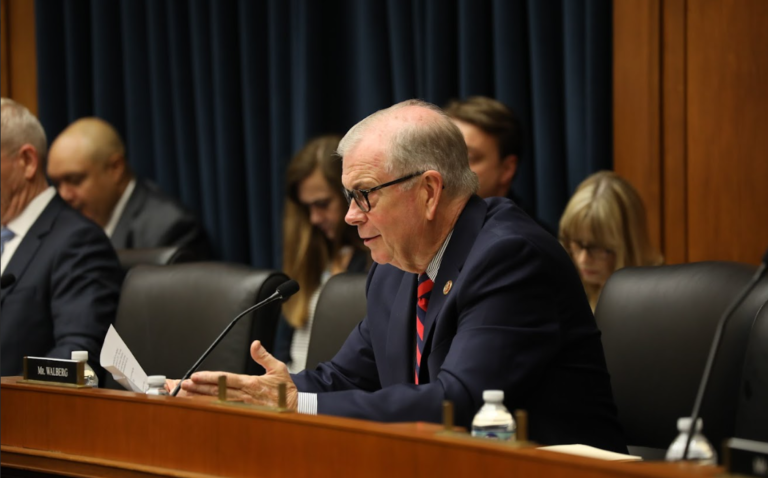Washington DC – Today, Congressman Tim Walberg (MI-05) and Congressman Andrew Clyde (GA-09) led 18 of their colleagues in introducing the Automobile Retail Sales Choice Act of 2023 (CARS) Act. This important bill would prohibit the Biden administration from implementing aggressive emissions standards for vehicles. Light and medium-duty vehicles limit consumer choice. The CARS Act also blocks future EPA vehicle emissions regulations that mandate specific technologies or limit vehicle availability based on engine type. The EPA announced these proposed regulations in April 2023 with the aim of promoting the introduction of electric vehicles. The rules will require more than two-thirds of all new cars to be electric by 2032.
“The Biden administration cannot continue creating regulations that limit consumer choice, hinder mobility, make family cars more expensive, and cede American automotive leadership and jobs to China.” Rep. Walberg said.. “Hardworking Americans have already experienced months of runaway inflation and high energy costs, and these efforts will only further increase the economic burden on Americans who cannot afford electric vehicles. , put a stop to this executive overreach, giving consumers the freedom to decide which car is best for them and their families, and forcing automakers to follow the unrealistic mandates promoted by the president’s Green New Deal. It will prevent you from being forced.”
“From gas stoves to restrictions on gasoline-powered cars, the Biden administration’s disruptive energy policies are nothing more than a flimsy attempt to extend government control over Americans’ daily lives.” Councilor Clyde said.. “Restricting consumer choice to advance the left’s Green New Deal is simply intolerable for hardworking Americans already burdened by soaring energy prices and record high inflation. It represents an unwarranted power grab. Additionally, President Biden’s plan to force families and workers across the country to buy expensive electric vehicles will ultimately hurt Americans’ wallets while simultaneously , which would enrich China, one of its biggest adversaries and a very dominant force in the EV market.The CARS Act, on the other hand, would protect both American consumers and automakers from negative impacts. It offers common-sense solutions for the Biden administration’s radical climate change policies and dangerous government overreach.”
Choosing a Automobile Retail Sales (CARS) Law
The Automobile Retail Sales Choice (CARS) Act would stop this government overreach by blocking the enforcement of regulations that seek to limit consumer choice, and instead allow consumers to choose the vehicle that best suits their needs. This allows you to choose. This law is as follows:
- Prohibits EPA from finalizing, implementing, or enforcing the proposed rule entitled “Multi-Pollutant Emission Standards for Light and Medium-duty Vehicles for Model Year 2027 and Beyond.”
- Prohibits the use of authority under the Clean Air Act to enact regulations that require the use of certain technologies or limit the availability of new vehicles based on engine type.
- Requires EPA to update regulations within two years that would limit the availability of new vehicles based on that vehicle’s engine.
- End the EPA’s radical policies that drive up costs for the public and hand over the keys to the U.S. auto industry to China
The full text of the bill can be found here.
background
In April 2023, the Environmental Protection Agency (EPA) announced a proposed rule called “Multi-Pollutant Emission Standards for Light and Medium-duty Vehicles for Model Year 2027 and Beyond.” The rule would set strict emissions standards for benchmark pollutants and greenhouse gases for these vehicles, and the EPA expects that these aggressive standards will reduce emissions from more than two-thirds of all new vehicles by 2032. predicted to become electric vehicles. This proposal raises serious concerns about: The availability of affordable cars for the average American consumer. The average price of an electric car was more than $17,000 more than the average price of a gas-powered vehicle, according to data from Kelley Blue Book. This expense would be on top of the additional $10,000 spent by households across the country over the past two years as a result of the economic crisis that fueled inflation.
In response to a similar rule, EPA’s “Controlling Air Pollution from New Motor Vehicles: Standards for Large Engines and Vehicles,” both the House and Senate passed SJRes. Article 11 provides for parliamentary disapproval. However, President Biden vetoed the resolution and continued to advance his administration’s environmental priorities.
